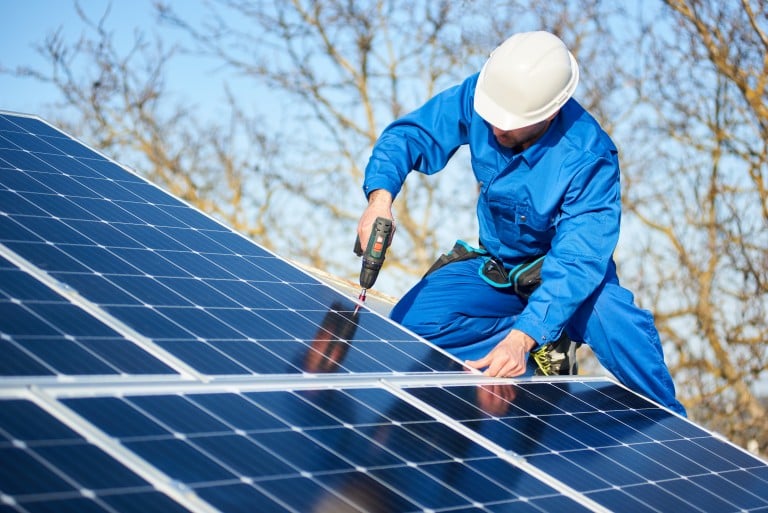Renewable energy is transforming the way we power our world. From solar panels to wind turbines, renewable energy systems are becoming an integral part of modern electrical infrastructure. For electricians, gaining expertise in renewable energy systems opens up exciting career opportunities in a fast-growing industry.

In this blog, we will explore the basics of renewable energy systems, their components, and the skills electricians need to work in this dynamic field.
What Are Renewable Energy Systems?
Renewable energy systems generate power from natural and sustainable resources like sunlight, wind, water, and biomass. Unlike fossil fuels, these resources are replenished naturally, making them environmentally friendly and cost-effective in the long term.
Common renewable energy systems include:
- Solar Power: Uses photovoltaic (PV) panels to convert sunlight into electricity.
- Wind Energy: Generates power through wind turbines that convert kinetic energy into electricity.
- Hydropower: Produces electricity using the flow of water in rivers or dams.
- Biomass Energy: Converts organic materials like wood and agricultural waste into energy.
Key Components of Renewable Energy Systems
Renewable energy systems consist of various components that work together to generate and store electricity. Some of the critical components include:
- Solar Panels: Capture sunlight and convert it into direct current (DC) electricity.
- Wind Turbines: Capture wind energy and convert it into mechanical power, which is then converted into electricity.
- Inverters: Convert DC electricity from solar panels or wind turbines into alternating current (AC) for use in homes and industries.
- Batteries: Store excess electricity for use during periods of low sunlight or wind.
- Charge Controllers: Regulate the flow of electricity to prevent overcharging or damage to batteries.
Why Electricians Should Learn Renewable Energy Systems
With the growing emphasis on sustainability, renewable energy is becoming a vital part of global power systems. Here’s why electricians should focus on renewable energy:
- High Demand: Governments and companies are investing heavily in renewable energy projects, creating job opportunities for skilled electricians.
- Future-Proof Career: As the world moves away from fossil fuels, renewable energy will dominate the power sector.
- Higher Earning Potential: Specializing in renewable energy systems can lead to better-paying roles and international job opportunities.
- Environmental Impact: Contributing to clean energy projects helps reduce carbon emissions and combat climate change.
Skills Required for Working in Renewable Energy
Electricians who want to work with renewable energy systems need to develop specific skills, including:
- Understanding of Renewable Technologies: Knowledge of how solar, wind, and other renewable systems work.
- Installation and Maintenance: Skills in installing and maintaining solar panels, inverters, and battery systems.
- Electrical Design: Ability to design circuits and systems that integrate renewable energy components.
- Problem-Solving: Identifying and fixing issues in renewable energy systems.
- Knowledge of Regulations: Familiarity with local and international codes and standards for renewable energy installations.
Steps to Start a Career in Renewable Energy
If you’re an electrician interested in renewable energy, here are the steps to get started:
- Complete Basic Electrical Training: Enroll in an ITI or vocational program to learn foundational electrical skills.
- Specialize in Renewable Energy: Take courses or certifications in solar installation, wind turbine maintenance, or energy efficiency.
- Gain Hands-On Experience: Work as an apprentice or intern on renewable energy projects to build practical skills.
- Stay Updated: Keep up with advancements in renewable energy technology and industry trends.
- Network with Professionals: Join renewable energy associations or attend trade expos to connect with industry experts.
Challenges in Renewable Energy Systems
Working with renewable energy systems comes with its own set of challenges:
- Weather Dependence: Solar and wind energy rely on environmental conditions, which can affect performance.
- High Initial Costs: Setting up renewable energy systems can be expensive, though costs are decreasing over time.
- Technical Complexity: Renewable systems involve advanced technologies that require specialized training.
Tip: Continuous learning and hands-on experience can help overcome these challenges.
Future of Renewable Energy in India
India is rapidly expanding its renewable energy capacity, with ambitious targets for solar, wind, and hydropower projects. As an electrician, this is an excellent time to specialize in renewable energy systems. Government initiatives like the National Solar Mission and Make in India are creating opportunities for skilled professionals in this field.
Conclusion
Renewable energy systems represent the future of the power industry, offering electricians a chance to work on innovative and impactful projects. By developing the necessary skills and gaining experience, you can secure a rewarding career in this growing sector. Start your journey today and become a part of the renewable energy revolution!